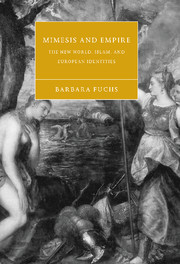Book contents
- Frontmatter
- Contents
- Acknowledgments
- Note on translations
- Introduction
- 1 Truth, fictions, and the New World
- 2 Literary loyalties, imperial betrayals
- 3 Lettered subjects
- 4 Virtual Spaniards
- 5 Faithless empires: pirates, renegadoes, and the English nation
- 6 Pirating Spain
- Conclusion: Contra originality
- Notes
- Bibliography
- Index
- Cambridge Studies in Renaissance Literature and Culture
4 - Virtual Spaniards
Published online by Cambridge University Press: 22 September 2009
- Frontmatter
- Contents
- Acknowledgments
- Note on translations
- Introduction
- 1 Truth, fictions, and the New World
- 2 Literary loyalties, imperial betrayals
- 3 Lettered subjects
- 4 Virtual Spaniards
- 5 Faithless empires: pirates, renegadoes, and the English nation
- 6 Pirating Spain
- Conclusion: Contra originality
- Notes
- Bibliography
- Index
- Cambridge Studies in Renaissance Literature and Culture
Summary
La mayor leyenda de la historia de España es la de su propia existencia política.
Pedro CórdobaChapter 3 analyzed how Inca Garcilaso and Guaman Poma, as New World writers, negotiate their way into Spanish discussions about the nature of empire or the proper government of the colonies by invoking and often manipulating Spain's racialized religious ideology. Garcilaso constructs himself as a true Spaniard by aligning himself with Christian Spain against Islam, and establishes careful distinctions between the American Indians – willing converts to the Faith – and recalcitrant Moors. Guaman Poma, on the other hand, invokes the Spanish hysteria over the improper mixing of bloods – Christian versus Jew or Moor – to argue for the survival of the Indian population of Peru and against increasing mestizaje. For these authors who are outsiders, able manipulation of Spanish exclusionary rules paradoxically provides a way in, even if, at least in the case of Guaman Poma, the historical results suggest the limitations of rhetorical strategies. Yet while it may not succeed in stopping the abuses they decry, their ability to identify, imitate, and indeed translate the ideology of Spanish identity affords them their own resistant subj ectivity.
The question then arises of how the Moriscos, a group consistently targeted and indeed demonized by a racialized religious ideology within Spain itself, were able to intervene in that ideology.
- Type
- Chapter
- Information
- Mimesis and EmpireThe New World, Islam, and European Identities, pp. 99 - 117Publisher: Cambridge University PressPrint publication year: 2001



